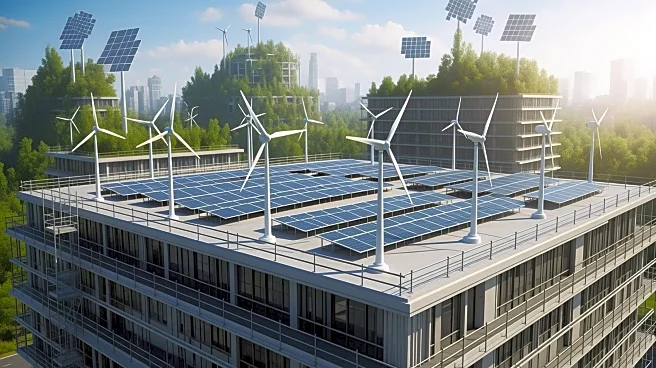What's Happening?
Manufacturers in the construction industry are increasingly embedding sustainability into their operations to meet growing demands for environmentally friendly building practices. According to a report by the built-environment platform NBS and the Royal
Institute of British Architects, 70% of UK construction projects now include sustainability targets, with a significant rise in net-zero projects. Companies like JELD-WEN are leading the charge by aiming to cut their Scope 1 and 2 emissions to zero at their Penrith site by 2026. This involves using renewable energy, electrification, and waste reduction strategies. The shift towards sustainability is not just about compliance with regulations but involves proactive measures by manufacturers to reduce emissions and improve resource efficiency.
Why It's Important?
The integration of sustainability into manufacturing processes is crucial for reducing the carbon footprint of the construction industry, which plays a central role in global emissions. By embedding sustainable practices, manufacturers can significantly impact the environmental performance of buildings. This shift is essential for meeting net-zero goals and aligns with broader environmental, social, and governance (ESG) objectives. Manufacturers that prioritize sustainability can gain a competitive edge as developers and contractors increasingly seek partners committed to reducing environmental impact. This trend also reflects a broader societal shift towards sustainability as a standard practice rather than an optional consideration.
What's Next?
As sustainability becomes a standard expectation in construction, manufacturers will continue to innovate and collaborate with contractors and specifiers to achieve net-zero goals. This will likely involve further investment in renewable energy, waste management improvements, and the adoption of new technologies to enhance efficiency. The industry may also see increased regulatory pressure to meet sustainability targets, prompting more companies to integrate these practices into their operations. The success of these initiatives will depend on the willingness of all stakeholders to prioritize sustainability in procurement and project planning.
Beyond the Headlines
The move towards sustainable manufacturing in construction has broader implications for the industry, including potential shifts in supply chain dynamics and increased emphasis on collaboration between different tiers of contractors and suppliers. This could lead to a reevaluation of procurement strategies and a focus on long-term partnerships with sustainability-minded manufacturers. Additionally, as sustainability becomes ingrained in industry practices, it may drive innovation in materials and construction techniques, further reducing the environmental impact of building projects.















